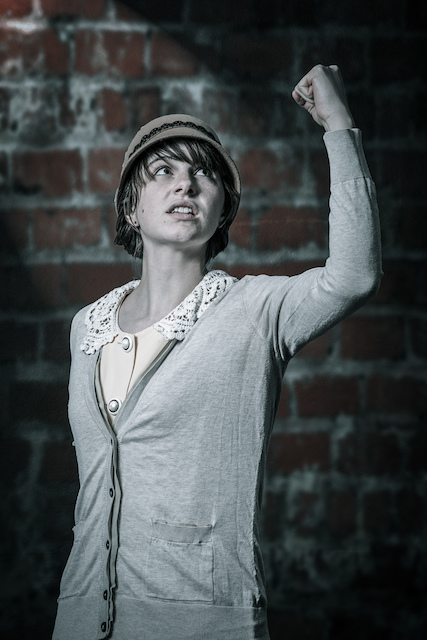Not all American celebrations of Irish culture are created equal. Some devolve into debauched parades of leprechauns imbibing green beer. Others actually seek to pay tribute to the unique history and traditions of the Emerald Isle. This year’s Southwest Irish Theater Festival offers something more substantial than a Guinness at the local pub with plays that show how Ireland’s history, landscape and politics have shaped its people. The festival, which takes place in Albuquerque and Santa Fe now through April 27, stages some of the hallmarks of Irish theater, such as Seán O’Casey’s Juno and the Paycock. “[This play] has so many of the qualities I admire in Irish drama: great storytelling, social commentary and lyrical language,” says director Brian Hansen. These traits also figure centrally in the festival’s other plays, which range from W.B. Yeats’ classic one-act Cathleen ni Houlihan, directed by David Olson at the James A. Little Theater in Santa Fe (1060 Cerrillos) March 22 and 29, to Patrick Fitzgerald’s Gibraltar, a contemporary adaptation of Joyce’s Ulysses directed by Michael Counts and debuting at Aux Dog Theatre (3011 Monte Vista NE) April 11.Ireland’s political strife is legendary, and each play depicts the cost of that conflict. How can individuals and families prevent politics from polluting the domestic space? What happens when the fighting on the streets infiltrates the home? The plays grapple with these questions and show how easily group hatreds and national ideologies slip through household doors. Characters struggle to hold on to their dignity amidst daily violence and abject poverty.But it’s not all doom and gloom. Moments of levity and comic relief illuminate the dark, as in Brian Friel’s Dancing at Lughnasa, directed by Leslee Richards, showing April 4-27 at the Adobe Theater (9813 Fourth Street NW). The play features sisters who face overwhelming loss. “Yet these women find joy, humor, beauty and love,” says Richards. “They live courageously. They choose to dance instead of despair.” Characters tell jokes, share stories and sing songs to transcend and escape from their daily struggles. The Vortex Theatre’s production of Juno and the Paycock (2004 Central SE) demonstrates how fluidly the comic flows into the tragic, the political into the personal. The play centers around a dilapidated Dublin tenement where the family of Juno and “Captain” Jack Boyle must contend with both poverty and the chaos of the Irish Civil War (1922-1923). Despite a grim setting, the play provokes frequent laughter with the antics of husband Jack, played with customary verve by Phil Shortell. Jack is chronically unemployed and complains of leg pains whenever a job comes his way. He’s clearly not much fun to live with, but he’s fun to watch thanks to Shortell’s animated gestures and Jack’s scoundrel sidekick, “Joxer” Daly. Jack’s shirking of responsibility contrasts starkly with the stabilizing, steadfast qualities of his wife. Played by Colleen McClure, Juno is forever at pains to rein in Jack’s antics, find a husband for her daughter and tend to the physical and emotional wounds of her ex-soldier son. “Who has kep’ th’ home together for the past few years—only me?” she exclaims, expressing the same fierce commitment to communal life attributed to her namesake, the Roman goddess Juno.At first, Juno tolerates and even laughs at her incorrigible husband, but as Jack’s behavior worsens, comedy quickly takes on the hue of tragedy. “There’s a free-floating quality to the play, but it’s also a domestic tragedy of incomparable pain that brilliantly captures the Irish capacity to self-delude,” says director Brian Hansen. Jack clings to the belief that an inheritance will solve his family’s financial woes. And yet Shortell sometimes fixes the audience with such a pained gaze that we half believe his character is aware of his many self-deceptions, even tortured by them. Given the many travails endured by the characters in Juno and the Paycock, it’s remarkable that they so frequently lift their voices in song. Conversations about the family’s numerous misfortunes are peppered with spirited renditions of poems and ballads. “If I were a blackbird, I’d whistle and sing,” croons the Boyles’ neighbor, Mrs. Maisie Madigan, energetically played by Linda Williams. “I’d follow the ship that my thrue love was in.” The longing expressed by these ditties opens up a pure space unsullied by otherwise all-pervasive political and familial woes. All the characters in O’Casey’s play are in chains, but occasionally they manage to sing in those chains like the sea, to paraphrase a Dylan Thomas poem. These moments of transcendence are all the more moving because they portend even greater sorrows. Juno and the Paycock concludes on a devastating, symbolic note when the red votive candle in front of the Virgin Mary icon is extinguished. “Th’ whole worl’s in a terrible state o’chassis,” slurs the disgraced Jack at the denouement, sprawled out on the floor in a drunken stupor. We laughed at that very same line earlier in the play, but now we can only wince.
Juno and the PaycockRuns through April 6Fridays and Saturdays at 7:30pm, Sundays at 2pmThe Vortex Theatre2004½ Central SETickets: $18247-8600, vortexabq.orgThe Southwest Irish Theater Festival runs through April 27. For a complete listing of events, visit alibi.com/link/15742.












